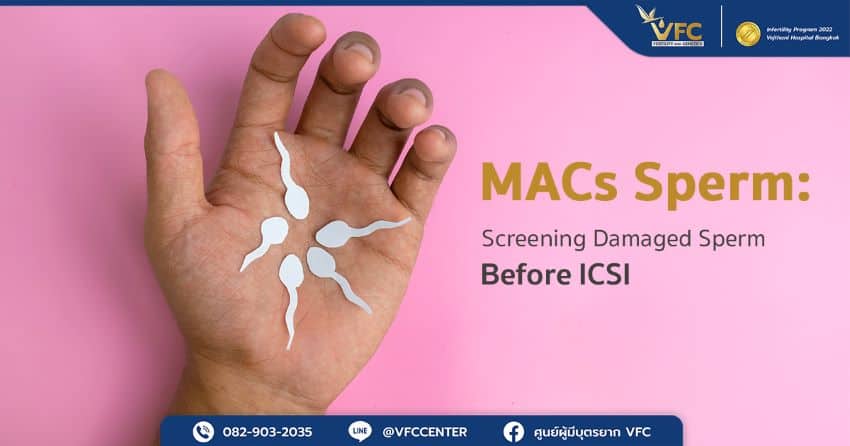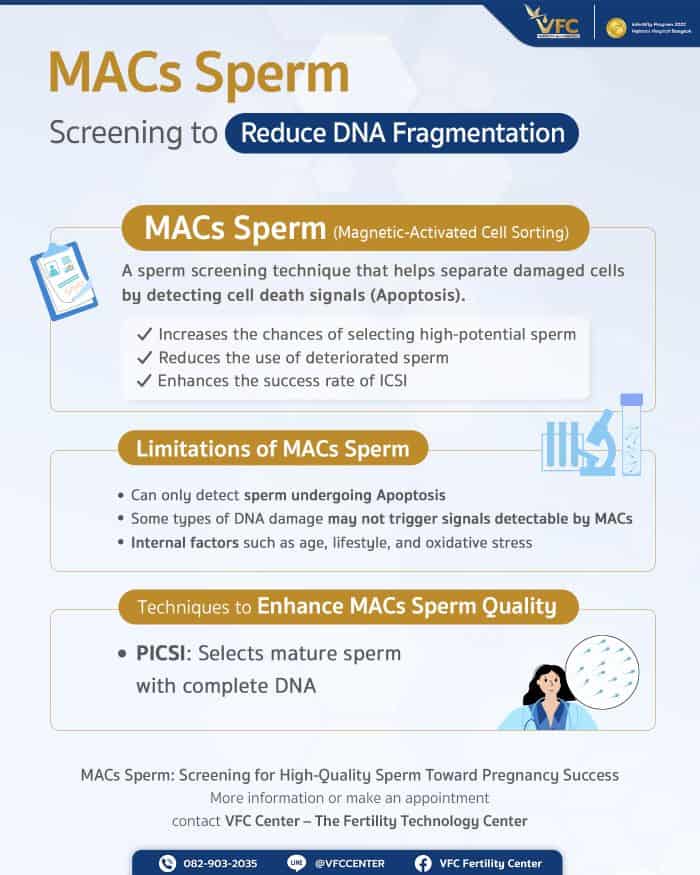
Sperm quality is not only about quantity or appearance but also the integrity of its internal structure. DNA fragmentation, a critical factor affecting sperm fertilization ability and embryo development, directly impacts success rates. When sperm DNA is damaged, it can increase the risk of miscarriage or incomplete pregnancy.
The MACs Sperm technique provides an effective solution by screening sperm with high DNA fragmentation, isolating sperm that are undergoing natural cell death (Apoptosis). While this technique has been proven beneficial, there may still be cases where high DNA fragmentation persists despite the screening.
Though rare, this underlines the need for comprehensive fertility planning, which may involve combining various approaches to enhance sperm quality and increase long-term fertility success.

“MACs Sperm” Screening Sperm for DNA Fragmentation
MACs Sperm (Magnetic-Activated Cell Sorting) is an advanced sperm screening technique that targets not just the physical properties of sperm but also specific biomarkers on the sperm surface.
The process involves using small magnetic nanobeads coated with special substances that bind to biomarkers indicating sperm undergoing apoptosis (natural cell death). A magnetic field is then applied to isolate and remove these damaged sperm, resulting in a selection of sperm with better genetic integrity.
This process significantly increases the chances of success in fertility treatments, particularly for couples struggling with infertility.
Benefits of Using MACs Sperm Technique
MACs Sperm offers molecular-level sperm selection, distinguishing it from traditional methods that rely on sperm density and motility. The key benefits include:
- Increased chances of selecting sperm with fertilization potential
- Reduced risk of using damaged or deteriorated sperm
- Higher success rates for ICSI procedures
Limitations to Know Before Using MACs Sperm
Although MACs Sperm improves sperm quality during fertility treatments, there are some limitations to consider:
- MACs Sperm can only screen sperm undergoing apoptosis; it may not detect sperm with DNA damage that does not exhibit apoptosis signals.
- The type of DNA damage, whether single-strand breaks or double-strand breaks, affects the efficiency of MACs Sperm.
- Damaged sperm may not trigger apoptosis, preventing its detection.
- Individual factors such as oxidative stress, age, and lifestyle habits can impact sperm DNA integrity.
Additionally, if DNA fragmentation remains high, combining other treatment options may be necessary, such as lifestyle changes, antioxidant supplements, or other medical techniques to enhance fertility success.
Other Techniques to Combine with MACs Sperm for Quality Sperm Screening
As mentioned, achieving successful fertility outcomes may require using additional Sperm selection techniques alongside MACs Sperm for the best results, such as:
PICSI (Physiological ICSI)
PICSI (Physiological ICSI) facilitates the selection of mature sperm with intact DNA by observing their natural ability to bind to hyaluronic acid (HA) on a specialized dish, thereby mimicking the environment surrounding the human oocyte and allowing for the selection of the most viable sperm for fertilization.
Combining various techniques may seem complex, but it plays a crucial role in improving ICSI success rates, especially in cases of recurrent miscarriages or previous infertility treatment failures.
The Importance of Long-Term Sperm Quality Restoration Alongside Technology
Even with advanced sperm screening technologies that enhance fertilization chances, maintaining sperm quality from within the body remains essential. Long-term restoration of sperm health should be prioritized to maximize fertility outcomes.

Approaches to Long-Term Sperm Quality Restoration
- Modify lifestyle to reduce oxidative stress: Avoid smoking, limit alcohol consumption, exercise regularly, and get sufficient sleep. This can help decrease the production of free radicals, which are a key cause of DNA fragmentation in sperm.
- Use antioxidant supplements: Taking vitamins and antioxidants like Coenzyme Q10, Zinc, Vitamin C, and Vitamin E can help reduce sperm DNA damage and improve reproductive health. Always consult a doctor for guidance on appropriate dosages.
- Plan sperm sample collection after balancing health: For optimal results, sperm collection should take place 2-3 months after improving overall health. This ensures better sperm quality for use in fertility treatments.
- Consult with a fertility specialist to design a personalized plan: improve sperm quality, ensuring that the right fertility technologies are used based on individual DNA damage levels.
Selecting high-quality sperm is just one part of the path to successful conception. Comprehensive planning is equally important, including sperm health assessments, DNA fragmentation risk evaluation, and the use of appropriate supplementary techniques.
If you’re looking for a fertility center in Bangkok, VFC Center (V Fertility Center) is here to provide expert care. Schedule a consultation with our specialists today to begin your journey toward a successful and healthy pregnancy.
For more information or to schedule an appointment, please contact:
VFC Center – V-Fertility Center
Hotline: 082-903-2035
LINE Official: @vfccenter

The team of specialists in obstetrics and gynecology and reproductive medicine





No Comments
Sorry, the comment form is closed at this time.